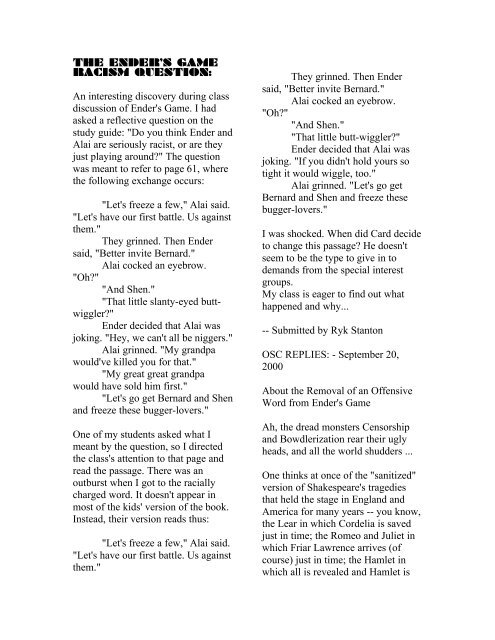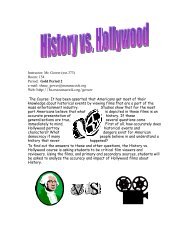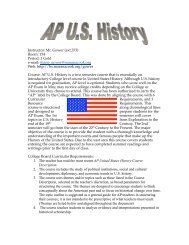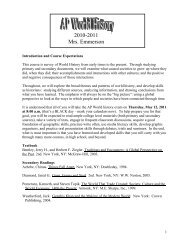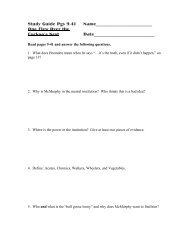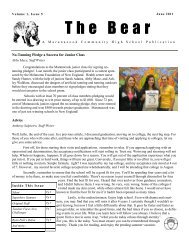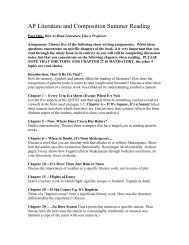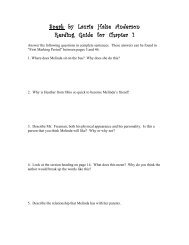THE ENDER'S GAME RACISM QUESTION: An interesting discovery ...
THE ENDER'S GAME RACISM QUESTION: An interesting discovery ...
THE ENDER'S GAME RACISM QUESTION: An interesting discovery ...
You also want an ePaper? Increase the reach of your titles
YUMPU automatically turns print PDFs into web optimized ePapers that Google loves.
<strong>THE</strong> ENDER’S <strong>GAME</strong><br />
<strong>RACISM</strong> <strong>QUESTION</strong>:<br />
<strong>An</strong> <strong>interesting</strong> <strong>discovery</strong> during class<br />
discussion of Ender's Game. I had<br />
asked a reflective question on the<br />
study guide: "Do you think Ender and<br />
Alai are seriously racist, or are they<br />
just playing around?" The question<br />
was meant to refer to page 61, where<br />
the following exchange occurs:<br />
"Let's freeze a few," Alai said.<br />
"Let's have our first battle. Us against<br />
them."<br />
They grinned. Then Ender<br />
said, "Better invite Bernard."<br />
Alai cocked an eyebrow.<br />
"Oh?"<br />
"<strong>An</strong>d Shen."<br />
"That little slanty-eyed buttwiggler?"<br />
Ender decided that Alai was<br />
joking. "Hey, we can't all be niggers."<br />
Alai grinned. "My grandpa<br />
would've killed you for that."<br />
"My great great grandpa<br />
would have sold him first."<br />
"Let's go get Bernard and Shen<br />
and freeze these bugger-lovers."<br />
One of my students asked what I<br />
meant by the question, so I directed<br />
the class's attention to that page and<br />
read the passage. There was an<br />
outburst when I got to the racially<br />
charged word. It doesn't appear in<br />
most of the kids' version of the book.<br />
Instead, their version reads thus:<br />
"Let's freeze a few," Alai said.<br />
"Let's have our first battle. Us against<br />
them."<br />
They grinned. Then Ender<br />
said, "Better invite Bernard."<br />
Alai cocked an eyebrow.<br />
"Oh?"<br />
"<strong>An</strong>d Shen."<br />
"That little butt-wiggler?"<br />
Ender decided that Alai was<br />
joking. "If you didn't hold yours so<br />
tight it would wiggle, too."<br />
Alai grinned. "Let's go get<br />
Bernard and Shen and freeze these<br />
bugger-lovers."<br />
I was shocked. When did Card decide<br />
to change this passage? He doesn't<br />
seem to be the type to give in to<br />
demands from the special interest<br />
groups.<br />
My class is eager to find out what<br />
happened and why...<br />
-- Submitted by Ryk Stanton<br />
OSC REPLIES: - September 20,<br />
2000<br />
About the Removal of an Offensive<br />
Word from Ender's Game<br />
Ah, the dread monsters Censorship<br />
and Bowdlerization rear their ugly<br />
heads, and all the world shudders ...<br />
One thinks at once of the "sanitized"<br />
version of Shakespeare's tragedies<br />
that held the stage in England and<br />
America for many years -- you know,<br />
the Lear in which Cordelia is saved<br />
just in time; the Romeo and Juliet in<br />
which Friar Lawrence arrives (of<br />
course) just in time; the Hamlet in<br />
which all is revealed and Hamlet is
saved to marry Ophelia; the Macbeth<br />
in which ... well, there was no saving<br />
Macbeth.<br />
The audience simply could not<br />
bear genuine tragedy, the noble heartwrenching<br />
deaths of those who<br />
should not die or who could have<br />
avoided death, had they only chosen<br />
a different course. So the stories were<br />
changed "just a little" to make them<br />
acceptable. After all, times had<br />
changed, and the plays had to change<br />
with them.<br />
So widespread were these new<br />
versions that almost no one had even<br />
heard of the original tragic endings.<br />
Shakespeare was even criticized for<br />
"his" implausible last-minute rescues.<br />
When the original versions were<br />
revived, published, and produced, it<br />
had an invigorating effect, and from<br />
that time on, bowdlerization -- named<br />
for Mr. Bowdler, who presumed to<br />
clean up indecorousness in dead<br />
writers' work, so that a more delicate<br />
audience might continue to enjoy<br />
them -- has been regarded as such an<br />
awful literary crime that there is no<br />
other comparable to it.<br />
But I know a worse one. That<br />
is the sin whereby, in pursuit of one<br />
small aim, the artist puts something<br />
in his work that causes it to be less<br />
effective, and then refuses to correct<br />
the flaw because that would not be<br />
"true" to the work.<br />
Let me be specific. I made up<br />
Ender's Game. It is what I made it to<br />
be. So if, in seeing its effect on the<br />
audience, I come to realize that a<br />
particular scene is not working, and<br />
that it is not working solely because<br />
of the use of a particular word, what<br />
kind of fool would I have to be to<br />
allow the dead me -- the me of 1984,<br />
who wrote that scene -- to prevail<br />
over the living me?<br />
Even as the old obscenities<br />
dealing with sex and excrement were<br />
unleashed upon the public, new<br />
obscenities moved from the realm of<br />
the merely indecorous to the sinful.<br />
What f* and s* (and worse words)<br />
had once been, now n* has become.<br />
<strong>An</strong>d, just as there were prudes who<br />
screamed in outrage and demanded<br />
that any work containing those old<br />
bad words must be banned, so we<br />
have a new group of prudes making<br />
identical demands about works<br />
containing the new bad word.<br />
The prudes are always with us.<br />
They are wrong to impart deep moral<br />
meanings to words themselves,<br />
regardless of context: there is no<br />
word which does not have a context<br />
in which it is not only the best word,<br />
but the only word that is right and<br />
good. But they are right to this extent:<br />
that there are words which become<br />
charged with meaning that sparks and<br />
shocks the reader no matter what the<br />
context.<br />
Such a word, today, is n*. In<br />
the scene just quoted, I had Ender<br />
using the word to wake Alai up to the<br />
fact that by calling Shen "slantyeyed,"<br />
Alai was being racist. A sort<br />
of tit-for-tat response: If you're going<br />
to call my East Asian friend "slantyeyed,"<br />
then you choose to live in the<br />
kind of world where you would be<br />
called "n*." Morally, this is clearly<br />
(to me, at least) a rejection of the<br />
kind of world where people call each
other names based on superficial<br />
racial characteristics.<br />
But, to show the scene and make it<br />
work, the word n* had to be used.<br />
Without it, there is no scene.<br />
The trouble was, first, with the<br />
prudes. Despite the fact that, as with<br />
Huckleberry Finn, the word was<br />
being used in a work that opposed<br />
racism, the word was being treated as<br />
if it were an absolute. Denying that<br />
the word can ever have a context that<br />
makes its use morally right, the<br />
prudes would have Ender's Game<br />
banned from reading lists for young<br />
readers because of the mere presence<br />
of that word.<br />
I could ignore the prudes -- I<br />
usually do -- but there was a worse<br />
problem. Because the word n* has<br />
been so thoroughly banned from<br />
public discourse (outside of Def<br />
Comedy Jam), almost all readers are<br />
shocked when they see the word. It<br />
stands out. It is as if, in the midst of<br />
hearing a play presented with normal<br />
speech, one word were suddenly<br />
screamed in a way quite<br />
inappropriate to the context. The<br />
audience, in such a case, is jarred,<br />
shocked, driven away from the scene<br />
that is going on before them, and<br />
forced to think about the one shouted<br />
word.<br />
In other words, the presence of<br />
n* was causing readers to break free<br />
from the spell of the story. <strong>An</strong>d so it<br />
had to be eliminated, for the sake of<br />
the purity of the experience of<br />
reading, just as surely as I also<br />
eliminate passages of language so<br />
pretty that it makes readers say, "Oh,<br />
how lovely," instead of concentrating<br />
on the onward-flowing tale.<br />
Do you doubt that this was<br />
happening? The very fact that you<br />
were trying to build a class discussion<br />
about whether Ender and Alai were<br />
racist based solely on that word<br />
proves that the scene was an utter<br />
failure. The word was so potent and<br />
absolutely bad to you that you<br />
actually considered it to be a<br />
potentially sustainable proposition<br />
that Ender was racist solely because<br />
he used that word. The word forced<br />
itself out of the context and instead of<br />
being an answer, it became a question<br />
-- the opposite of the intended effect.<br />
If I had not already changed the<br />
passage, I would have changed it the<br />
moment I learned that a teacher was<br />
actually asking a class, "Do you think<br />
Ender and Alai are seriously racist, or<br />
are they just playing around?" In fact<br />
the scene should be absolutely clear<br />
that Ender is neither racist nor<br />
playing around, but is instead<br />
insisting that Alai not make racially<br />
derogatory statements about his<br />
friend Shen. If the word n* were not<br />
absolute in your mind, you would<br />
never have asked that question. So,<br />
while you may be "shocked" that I<br />
would change the passage, I can<br />
assure you, you, and those who<br />
would read this scene as you did, are<br />
the main reason I have changed it.<br />
Which is not to say that I<br />
might not have made the same<br />
change simply to please the prudes. I<br />
don't care what the prudes think of<br />
me -- prudes of left and right both<br />
detest me and my work, and will
continue to do so. But the prudes<br />
have the power to have my work<br />
banned from or made less accessible<br />
to young readers. Though I did not<br />
intend Ender's Game for a youthful<br />
audience, it has in fact proved to have<br />
some value and importance for many<br />
young readers. So, for the sake of that<br />
one word (and the short sequence<br />
supporting it), should I keep a portion<br />
of those young readers who might<br />
value the book from having a chance<br />
to read it? How impractical. How<br />
silly.<br />
If this were a scene that had a<br />
central bearing on the main threads of<br />
the tale so that, by changing it, I<br />
changed the moral freight carried into<br />
the reader's heart by this book, then I<br />
might have found it more difficult to<br />
make the change. But it is not<br />
important -- the meaning of this scene<br />
is conveyed in dozens of other more<br />
effective ways elsewhere in the book<br />
-- and so I changed it without a<br />
second thought, and don't regret<br />
making the change.<br />
If I were one of those writers<br />
who got all mystical about writing<br />
and thought some muse or other<br />
divine influence gave me the words I<br />
write, then I might regard them as<br />
sacred and unchangeable. But I am<br />
not one of those writers -- I am<br />
actually a serious artist, not a mystic,<br />
and I know that there are a hundred<br />
right ways to do every scene and<br />
every passage, and a thousand ways<br />
that seem right but are not quite right.<br />
Moreover, my training is in theatre,<br />
where playwrights know that they<br />
cannot know what they have wrought<br />
until it is before an audience,<br />
whereupon they begin serious<br />
revisions to make the play work<br />
properly as a tool for creating the<br />
story in the minds of the audience.<br />
When the problem of using n*<br />
in Ender's Game was called to my<br />
attention, it was as if I were standing<br />
in the audience of my play and heard<br />
the people laughing in the midst of a<br />
scene where laughter was completely<br />
wrong. Whatever is causing<br />
inappropriate laughter, the playwright<br />
must eliminate it at once; so in this<br />
case, what was causing distraction,<br />
the word n*, needed to be eliminated<br />
for the overall scene to work<br />
properly, and for the story to remain<br />
accessible to its whole potential<br />
audience.<br />
No one has ever missed the<br />
word or the sequence that it occurred<br />
in. Your class would not have noticed<br />
it, or valued the book one whit less,<br />
had you not called their attention to<br />
the difference. Indeed, the fact that<br />
now there is nothing to "notice" there,<br />
the fact that your class had no idea<br />
what you were talking about when<br />
you suggested Ender might be racist,<br />
proves that the change was necessary<br />
and effective.<br />
Which is not to say I'll never<br />
use n* -- or any other word -- when I<br />
find it necessary and appropriate. In<br />
this case, it was neither, and so it's<br />
gone.


